From the San Francisco Chronicle which provides an excellent overview of the debate about whether depression is a brain disorder rooted in genetics or not. Read the Story
Depression Is Still a Mystery – We Need a New Model
How Brain Cells Lift Mood in the Sleepless
Learn more about what happens to neurotransmitters during sleep. Read the Story
Happiness is How You Are, Not How You Feel
Aristotle said, “Happiness is the meaning and the purpose of life, the whole aim and end of human existence.” For him and most of his contemporaries, happiness referred not to an emotion but the long-term pattern of action, the sum of which was your moral character. It is the habits of virtue that are acquired over years of exercising the appropriate virtues.
A person doesn’t feel happy as much as happiness is a general state of being. Viewing happiness as something in the world as opposed to an individual feeling is not the way we usually understand the term.
The modern orientation is dominated by individual psychology. But something of the older understanding of happiness as essentially relational still exists in a secondary meaning. For example, we continue to refer to “good times,” or a particular era in a country, or to a happy period in a person’s life. This refers not to feeling happy per se—the kind of happiness that brings a smile to our face—but to a condition that arises in a larger context of actions, conditions, and behavior. To live well is to be good. A happy life is a good life, on this account, and a good life is a virtuous life.
“Happiness is the highest good,” Aristotle wrote. And happiness is realized through the practice of virtue. Happiness casts its gaze outward and is obtainable through the cultivation of moral habits.
The story of beautiful Narcissus is the cautionary tale. He drowns in his own reflection because in his love of himself there is no room for others. For Aristotle, friendship is central to human well-being. Human flourishing isn’t possible without it.
“Friends enhance our ability to think and to act,” Aristotle wrote. This isn’t just any way of thinking or acting but consists of good judgment and virtuous behavior. Friends hold us up to our better selves, directing us toward the good.
You need friends to do good and without them you are likely to fail. It is a failure to be virtuous, and without virtue you can’t be happy. Narcissus drowns because in his self-love there is no one to bring him to develop his moral character.
According to Aristotle, it isn’t good luck or fortune that determines whether you will be happy, although he acknowledges the importance of possessing certain goods as making the attaining of a good life more likely. Friendship, wealth, and power all contribute to a good life.
Conversely, happiness is endangered if you are severely lacking in certain advantages—for example, if you are extremely ugly or disfigured, or have lost children or good friends through death. Tragedy and misfortune hinder human flourishing. This is the impetus behind eliminating social injustices and addressing basic human needs—to open up life’s possibilities even to those beset by bad luck.
Today, I think Aristotle would have added the disadvantage of clinical depression, for, as we now know, this is a bio-chemical illness that is beyond the power of the mind to control through a change of attitude or behavior. Other forms of mental illnesses fall into this category. These are medical issues, not philosophical ones. In addition, I think he would have understood how the subordination of women was contrary to the good life. Parity in terms of power between men and women is necessary for the over-all happiness in society.
Basic needs of nutrition and shelter are necessary for a good life, as is access to knowledge. Good fortune and happenstance play a role in happiness but typically luck isn’t a determining factor. As the work of psychologist Martin E. P. Seligman demonstrates, factors such as money and health account for less than 20 percent of the variance in life satisfaction.
People rise above material circumstances by developing their moral character so that you act virtuously despite the limitations. It is possible to have the disposition to be good most of the time despite the lack of material support.
By Arthur Dobrin, D.S.W.
Depression From the Outside: Dealing with Depressed Colleagues
From the lawyer blog Balancing the Bar, a piece about how to help someone that’s depressed. Read the Blog
Dan’s Top 10 Stress Books
 Based on Dr. Jon Kabat-Zinn’s renowned mindfulness-based stress reduction program, this book shows you how to use natural, medically proven methods to soothe and heal your body, mind, and spirit. The title? Oh, that’s from the classic book Zorba the Greek. Zorba is a Greek full of a salty zest for life. At one point, his intellectual benefactor asked him, “Zorba, are you married?” Zorba snorts, “Married? Wife, kids, house . . . the full catastrophe!” When all of our lives are pulled about by the catastrophe of daily living, we need mindfulness to ground us, we need the deep breathing and quiet to enrich the quiets place in all of us.
Based on Dr. Jon Kabat-Zinn’s renowned mindfulness-based stress reduction program, this book shows you how to use natural, medically proven methods to soothe and heal your body, mind, and spirit. The title? Oh, that’s from the classic book Zorba the Greek. Zorba is a Greek full of a salty zest for life. At one point, his intellectual benefactor asked him, “Zorba, are you married?” Zorba snorts, “Married? Wife, kids, house . . . the full catastrophe!” When all of our lives are pulled about by the catastrophe of daily living, we need mindfulness to ground us, we need the deep breathing and quiet to enrich the quiets place in all of us.
 Dr. Robert M. Sapolsky has chapters on how stress affects sleep and addiction, as well as new insights into anxiety and personality disorder and the impact of spirituality on managing stress.
Dr. Robert M. Sapolsky has chapters on how stress affects sleep and addiction, as well as new insights into anxiety and personality disorder and the impact of spirituality on managing stress.
As Sapolsky explains, most of us do not lie awake at night worrying about whether we have leprosy or malaria. Instead, the diseases we fear-and the ones that plague us now-are illnesses brought on by the slow accumulation of damage, such as heart disease and cancer. When we worry or experience stress, our body turns on the same physiological responses that an animal’s does, but we do not resolve conflict in the same way-through fighting or fleeing. Over time, this activation of a stress response makes us literally sick.
 Jesus, Moses, the Buddha, and other great teachers were born with brains built essentially like anyone else’s, but used their minds to change their brains in ways that changed history. With the new breakthroughs in neuroscience, combined with the insights from thousands of years of contemplative practice, this book shows readers how to have greater emotional balance in turbulent times, as well as healthier relationships, more effective actions, and a deeper religious or spiritual practice. It’s full of practical tools and skills readers can use in daily life to tap the unused potential of the brain and rewire it over time for greater peace and well-being.
Jesus, Moses, the Buddha, and other great teachers were born with brains built essentially like anyone else’s, but used their minds to change their brains in ways that changed history. With the new breakthroughs in neuroscience, combined with the insights from thousands of years of contemplative practice, this book shows readers how to have greater emotional balance in turbulent times, as well as healthier relationships, more effective actions, and a deeper religious or spiritual practice. It’s full of practical tools and skills readers can use in daily life to tap the unused potential of the brain and rewire it over time for greater peace and well-being.
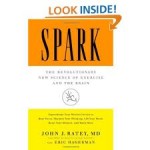 This book offers a fascinating investigation into the transformative effects of exercise on the brain, from the bestselling author and renowned psychiatrist John J. Ratey, MD. Did you know you can beat stress, lift your mood, fight memory loss, sharpen your intellect, and function better than ever simply by elevating your heart rate and breaking a sweat? The evidence is incontrovertible: Aerobic exercise physically remodels our brains for peak performance. This is one of the few books that got me off my ass and into the gym.
This book offers a fascinating investigation into the transformative effects of exercise on the brain, from the bestselling author and renowned psychiatrist John J. Ratey, MD. Did you know you can beat stress, lift your mood, fight memory loss, sharpen your intellect, and function better than ever simply by elevating your heart rate and breaking a sweat? The evidence is incontrovertible: Aerobic exercise physically remodels our brains for peak performance. This is one of the few books that got me off my ass and into the gym.
This is a short book and easy to read. Jan Chozen Bays, M.D., a physician and Zen teacher, has developed a series of simple practices to help us cultivate mindfulness as we go about our ordinary, daily lives. Exercises include: taking three deep breaths before answering the phone, noticing and adjusting your posture throughout the day, eating mindfully, and leaving no trace of yourself after using the kitchen or bathroom. Each exercise is presented with tips on how to remind yourself and a short life lesson connected with it.
The Relaxation and Stress Reduction Workbook
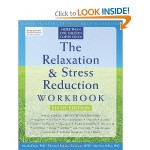 This book details easy, step-by-step techniques for calming the body and mind in an increasingly overstimulated world. It’s based on the latest research, and draws from a variety of proven treatment methods, including progressive relaxation, autogenics, self-hypnosis, visualization, and mindfulness and acceptance therapy. In the first chapter, you’ll explore your own stress triggers and symptoms, and learn how to create a personal plan for stress reduction. Each chapter features a different method for relaxation and stress reduction, explains why the method works, and provides on-the-spot exercises you can do to apply that method when you feel stressed.
This book details easy, step-by-step techniques for calming the body and mind in an increasingly overstimulated world. It’s based on the latest research, and draws from a variety of proven treatment methods, including progressive relaxation, autogenics, self-hypnosis, visualization, and mindfulness and acceptance therapy. In the first chapter, you’ll explore your own stress triggers and symptoms, and learn how to create a personal plan for stress reduction. Each chapter features a different method for relaxation and stress reduction, explains why the method works, and provides on-the-spot exercises you can do to apply that method when you feel stressed.
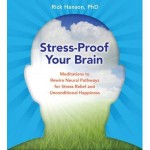 Our brains have evolved powerful tools for coping with threats and danger-but in the face of modern stresses like information overload, money worries, and interpersonal conflicts, our survival reflexes can do more harm than good. To help you adapt your nervous system to the challenges of today’s world, neuropsychologist Dr. Rick Hanson presents Stress-Proof Your Brain. Join him to learn research-based techniques and meditations that will literally re-shape your brain to make you more resilient, confident, and peaceful, including: – How to replace your brain’s unhealthy reactions to stress with protective and self-nurturing responses- Techniques for using memory to soothe and release painful feelings of sadness, guilt, anxiety, inadequacy, or anger – Guided meditations for calming chronic worries, developing gratitude, building inner strength, and more.
Our brains have evolved powerful tools for coping with threats and danger-but in the face of modern stresses like information overload, money worries, and interpersonal conflicts, our survival reflexes can do more harm than good. To help you adapt your nervous system to the challenges of today’s world, neuropsychologist Dr. Rick Hanson presents Stress-Proof Your Brain. Join him to learn research-based techniques and meditations that will literally re-shape your brain to make you more resilient, confident, and peaceful, including: – How to replace your brain’s unhealthy reactions to stress with protective and self-nurturing responses- Techniques for using memory to soothe and release painful feelings of sadness, guilt, anxiety, inadequacy, or anger – Guided meditations for calming chronic worries, developing gratitude, building inner strength, and more.
 Stress proof your life is for people who struggle to find time for a shower, much less a bath. The ones who worry that stress is affecting their health and relationships. Or they would worry if they weren’t so knackered. Some people are really good at avoiding some stresses without realizing that they are slaves to another kind. Elisabeth Wilson looks at the sources – occupational, genetic and environmental – and reveals 52 brilliant techniques for creating a stress-free zone. When your batteries are blown and burnout is imminent these top tips can help you regain control.
Stress proof your life is for people who struggle to find time for a shower, much less a bath. The ones who worry that stress is affecting their health and relationships. Or they would worry if they weren’t so knackered. Some people are really good at avoiding some stresses without realizing that they are slaves to another kind. Elisabeth Wilson looks at the sources – occupational, genetic and environmental – and reveals 52 brilliant techniques for creating a stress-free zone. When your batteries are blown and burnout is imminent these top tips can help you regain control.
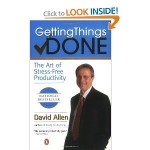 If you’re like me, my biggest source of stress comes from the pressure to get lots of things done everyday.
If you’re like me, my biggest source of stress comes from the pressure to get lots of things done everyday.
In Getting Things Done, veteran coach and management consultant David Allen shares the methods for getting things done. Allen’s premise is simple: our productivity is directly proportional to our ability to relax. Only when our minds are clear and our thoughts are organized can we achieve effective productivity and unleash our creative potential* Apply the “do it, delegate it, defer it, drop it” rule to get your in-box to empty.
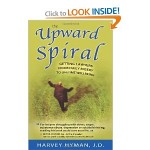 Lawyers help others but take very poor care of themselves. In their quest to max out their earning potential and afford the best material goods our economy has to offer, lawyers lead a narrow, grimly serious existence without emotional rewards. They work inhuman hours yet always feel pressured for time. Since they never stop, breathe, and relax, they are frequently tense, irritable and ready to bark. Author Harvey Hyman, himself a former trial lawyer, gives us the latest science, wit and wisdom in a book I highly recommend.
Lawyers help others but take very poor care of themselves. In their quest to max out their earning potential and afford the best material goods our economy has to offer, lawyers lead a narrow, grimly serious existence without emotional rewards. They work inhuman hours yet always feel pressured for time. Since they never stop, breathe, and relax, they are frequently tense, irritable and ready to bark. Author Harvey Hyman, himself a former trial lawyer, gives us the latest science, wit and wisdom in a book I highly recommend.
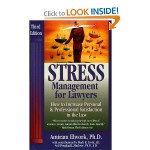 When you practice law, stress comes with the territory. Such stressors as time pressures, work overload, conflict, and difficult people can rob you of a satisfying career and personal life. It doesn’t have to be that way, however. You can take effective action and this book, written specifically for lawyers, shows you how.
When you practice law, stress comes with the territory. Such stressors as time pressures, work overload, conflict, and difficult people can rob you of a satisfying career and personal life. It doesn’t have to be that way, however. You can take effective action and this book, written specifically for lawyers, shows you how.
More Evidence that Exercise May Help Treat Depression
From Time Magazine, an article about a new study which shows the power of exercise to treat depression. Read the Story
Lawyer Depression is Contagious
Catch a depressed mood the way you catch a cold? Not exactly . . . but similar. Can other people really be a source of the rising rate of depression in the United States? The scientific evidence suggests the answer is yes. Our social lives play a huge role in how we think and feel. After all, none of us are immune to the influence of others, for better or worse. How we react to others, and vice-versa, even has a measurable biological impact on our brain chemistry, as our newest brain research shows us. The evidence is rapidly mounting that depression is about much more than just an individual’s “bad chemistry.” Thinking of depression as a brain disease is proving to be too one-dimensional a perspective.
For attorneys, appreciating the social connection to depression is vital if the person is to be viewed – – and responded to – – realistically. Why are attorneys depressed? Go beyond biology as the cause and consider that law is a profession that:
• Often requires engaging in stressful, conflictual relationships.
• Often pressured by important and inflexible deadlines.
• Often is devalued by the general public and even may be misunderstood by friends and family.
• Often brings you into contact with some of the worst aspects of human nature.
• Encourages hazardous self-sacrifice for “the cause.”
• Encourages deceiving others as well as one’s self, a moral compass, in the push for maximizing billable hours.
• Demands full commitment to making efforts to achieve things one has no control over.
• Encourages rumination, a poor coping mechanism.
• Can sometimes be almost as costly in winning as in losing, increasing uncertainty about what’s best.
• Can be as emotionally high and low as professional sports (“the thrill of victory . . . the agony of defeat.”)
The social aspects of depression have been too long ignored in favor of biological explanations. It would be more helpful to come to terms with the reality that no amount of medication will make potentially depressing situations, like the stressful aspect of practicing law, go away.
The rising rate of depression is not unique to either Americans or lawyers, lending further support to the growing recognition of depression being spread across boarders through social means. Through the studies of cultures, families, and the social lives of depressed people, we have learned a great deal about the social transmission of depression. Negative people can bring us down and good relationships involving an enduring commitment can bring us up. We have also learned how children model their parents in unexpected ways that increase their vulnerability to depression. Thus, in a purely social sense, depression is contagious.
The World Health Organization (WHO) is the international watchdog of health issues around the world. Recently, WHO declared depression the fourth greatest cause of human suffering and disability in the world (behind heart disease, cancer and traffic accidents). The WHO statement tells us how prevalent and how serious depression is right now. Even more troubling, though, is the WHO prediction that by the year 2020 depression will have risen to become the second greatest cause of human disability and suffering. It is a safe prediction for WHO to make, for we already have a half-century worth of data showing that depression has steadily been on the rise for decades.
By focusing on biology alone, as we have done when we talk about chemical imbalances in the brain or calling depression a “disease,” the social dimension has been all but ignored. This allows the social conditions that cause and exacerbate depression in many people’s lives to go unaddressed. Drugs alone cannot address the social factors that underlie depression, a likely reason that drug treatment alone (without additional skill-building) has the highest rate of relapse of any form of intervention. Just as there will never be a pill that can cure our other social issues such as poverty or racisim, there will never be a pill that will cure the depression that is associated with challenging life conditions. This is not to say biology doesn’t matter. It clearly does. But to focus on biology to the exclusion of life’s circumstances, especially the social ones, that lead people in general, and attorneys in particular into depression, is missing a vital target of intervention. Too often, well-intentioned doctors write a prescription for an anti-depressant medication but go no further into treatment. The evidence is growing that this practice is, to put it mildly, less than ideal.
The new understandings about the prominence of social forces in depression require we as mental health professionals to change some of what we do as we try to educate people about depression. The familiar phrasing that suggests “depression is a serious medical illness requiring medication” is an educational approach it that clearly doesn’t work very well. Most of the attorneys who are depressed don’t seek help. For some, it’s because of the stigma of seeking help for an emotional disorder, but for others it’s because they simply don’t think of themselves as “diseased.” They may feel stressed, unhappy, overwhelmed, trapped, or hopeless but they don’t consider themselves “depressed.” In fact, most of the attorneys who suffer depression, still manage to function despite their condition. They show up for work, they give their clients reasonably good legal advice, they get their briefs filed on time, and they participate in family events. But, they are struggling to get through each day. They are what many clinicians refer to as the “walking wounded.”
We can do better than suggest to people they’re diseased and need drug care. Who can do more than continue to push the one-dimensional biological explanation at people for their depression? We can help them understand that depression is caused by many contributing factors of which some are indeed biological, while others are rooted in individual psychology (such as your temperament and style of coping with stress) and social psychology (such as the quality of your relationships and your culturally acquired views). Striving to convince people they’re diseased doesn’t empower them to actively change their lives in meaningful ways. We can teach better relationship skills, better problem-solving skills, better decision-making skills, and better ways to cope with an increasingly complex world. We can teach attorneys-to-be while still in law school how to develop realistic perceptions of life as a lawyer so they won’t get so disillusioned they flee the practice of law so soon after graduating. These are just some of the skills that have not only been shown to reduce depression, but even to prevent it.
Editor’s Note: Michael D. Yapko, Ph.D., is a clinical psychologist and depression expert from Fallbrook, California. He is the author of Depression is Contagious: How the Most Common Mood Disorder is Spreading Around the World and How to Stop It. For more information visit his website at www.yapko.com.
Judicial Balance: Lessons for Law and Life
Wonderful site with plenty of posts and ideas about how judges can lead healthier and happier lives. Go to the site
Depression’s Negative Thinking
Years ago, when I had just been told I had something called “depression,” I was having a tough time accepting it – after all, I was a litigator, a good-slinger extraordinaire. The only thing that I thought could bring me down was a lucky pistol shot at High Noon.
During a talk with my therapist in the beginning of my recovery a decade ago, I told him all the negative thoughts I was having about my life. My counselor, a large, white -bearded older man with an Obi Wan Kenobi-like aura, gently told me, “Dan that is depression talking.” Somehow that got through to me; somehow I knew it was true.
My counselor, pillar of Jedi knowledge that he was, had helped me look through a sort of psychic telescope into the constellation that was my patterns of depressive thinking. All people who have struggled with depression must do combat with their negative thoughts. They must – usually with a therapist’s help – begin to see that THEY are thinking these thoughts and they’re not just HAPPENING to them.
Negative Thoughts – and Lots of Them
It has been estimated that we have anywhere from 25,000 to 50,000 thoughts a day. If your ideas about life are predominantly downbeat, imagine how many negative thoughts you are generating daily—thousands upon thousands.
In the magazine Psychology Today, Hara Estroff Marano writes:
“One of the features of depression is pessimistic thinking. The negative thinking is actually the depression speaking. It’s what depression sounds like. Depression in fact manifests in negative thinking before it creates negative affect. Most depressed people are not aware that the despair and hopelessness they feel are flowing from their negative thoughts. Thoughts are mistakenly seen as privileged, occupying a rarefied territory, immune to being affected by mood and feelings, and therefore representing some immutable truth.
Compounding the matter is that negative thinking slips into the brain under the radar of conscious awareness and becomes one of the strongest of habit patterns. People generate negative thoughts so automatically they are unaware that it is happening; that it is actually a choice they are making.”
Lawyers are particularly prone to this type of pessimistic thinking which helps explain why their rates of depression are about twice that – twenty percent – of the general population.
In recent article in The Wall Street Journal wrote about this very topic:
“Martin E. P. Seligman, a psychologist and proponent of ‘positive psychology,’ observes that lawyers experience depression at rates that are 3.6 times as high as that of other employed people. They also abuse alcohol and illegal drugs at rates above what’s seen in non-lawyers. Why is this? In part, he says, the law selects people with a glass-half-empty attitude. His research has found that people who score low on an optimism test do better in law school. ‘Pessimism, he writes, ‘is seen as a plus among lawyers, because seeing troubles as pervasive and permanent is a component of what the law profession deems prudence.
A prudent perspective enables a good lawyer to see every conceivable snare and catastrophe that might occur in any transaction. The ability to anticipate the whole range of problems and betrayals that non-lawyers are blind to is highly adaptive for the practicing lawyer who can, by so doing, help his clients defend against these far-fetched eventualities. If you don’t have this prudence to begin with, law school will seek to teach it to you. Unfortunately, though, a trait that makes you good at your profession does not always make you a happy human being’’.
The Big Ten
For us to start making different choices about what kind of thoughts we think, it’s important to see the patterns, the way these false thought patters take place over and over again. Here are some examples of depressive thinking:
1. False extremes – “the tendency to evaluate [one’s own] personal qualities in extreme, black-and-white categories; shades of gray do not exist.”
2. False generalization – “after experiencing one unpleasant event, we conclude that the same thing will happen to us again and again.”
3. False filter – “we tend to pick out the negative in every situation and think about it alone, to the exclusion of everything else.”
4. False transformation – “we transform neutral or positive experiences into negative ones.”
5. False mind-reading – “we may think we can tell what someone is thinking about us, that the person hates us or views us as stupid. But such negative conclusions usually are not supported by the facts.”
6. False fortune-telling – “we expect catastrophe and the expectation itself produces hopelessness and helplessness.”
7. False lens – “we view our fears, errors, or mistakes through a magnifying glass and deduce catastrophic consequences. Everything then is out of proportion.”
8. False feelings-based reasoning – depressed persons “tend to take their emotions as the truth. They let their feelings determine the facts.”
9. False “shoulds” – “Our lives may be dominated by ‘shoulds’ or ‘oughts,’ applied to ourselves or others. This heaps pressure on us and others to reach unattainable standards.”
10. False responsibility – “when we assume responsibility and blame ourselves for a negative outcome, even when there is no basis for this.”
A common theme running through much of this type of thinking is a self-judgment of inadequacy and, as a result, the depressed person notices negative, misfortunate circumstances but ignores positive, fortunate circumstances.
Overachievers and perfectionist that they are, depressed lawyers may frequently receive positive feedback concerning his or her performance at work. For example, a depressed lawyer may have a caseload of one hundred cases. He might have the upper hand on 90%, but struggles with the 10%. This lawyer sees his struggle with the handful of cases as confirming what a loser he or she is, incompetent and unable to keep up “like everyone else.” The many positive comments made by colleagues or staff are not even remembered.
Because of the belief that he or she is inadequate, and his or her tendency to only notice negative experiences, the future is viewed as certain to be gloomy, dismal, and painful: “I’ll never make partner,” “I suck as a lawyer.”
Negative thinking sounds, to the outside observer, to be obviously false or negatively skewed. If so, just why do depressives repeatedly think like this over and over again? Are they idiots?
No, it’s because depressive thinking is “automatic.” It is not the result of thinking the situation through objectively – ironically enough, something lawyers are trained to do.
It just happens rapidly without any reflection.
So it’s the event itself that is sad, not life in general. And even if this thought or feeling arises, it is only temporary.
Depressive thinking leads to depression, leads to depressive thinking, leads to. . .
As we explain these thinking styles you will see how each helps to maintain depression, by altering how we perceive reality.
It’s these thinking styles that make it so hard to see an end to the depression, as they limit our possibilities of thought. Once these patterns take hold, the emotional arousal they cause begins to affect us physically.
If you are thinking now “Yeah, but you don’t know my life” – remember: there is nothing so awful that you can imagine that someone somewhere hasn’t survived without becoming depressed.
It is not your fault if you are depressed, but there are concrete, effective things you can do about it.
How to Kick Negative Thinking’s Butt
Again, Estroff Marrano offers some ways to combat negative thoughts:
- Distract yourself. Engaging, pleasant activities, such as exercise or hanging out with friends, are best. Once you are feeling more positive, you will be better able to solve problems.
- Stop that train of thought. Think or even tell yourself “Stop!” or “No!” when you start to ruminate.
- Write it down. Tracking your ruminative thoughts in a journal can help you overcome depression by organizing those thoughts and relieving yourself of their burden.
- Solve a problem. Even taking a small step toward solving one problem that is weighing you down will help with overcoming depression. Data show a strong link between goals you cannot achieve and depression-inducing ruminative thinking, so start problem solving.
- Identify triggers. Figure out which places, times, situations, or people are most likely to cause a bout of rumination, and find ways to avoid those triggers or manage them better. Mornings and evenings are the times when ruminative thinking is most likely.
- Meditate. Mindfulness techniques can help you get some distance from the thoughts that trouble you, while at the same time reducing stress.
- Stop linking small goals to big goals. For example, you may need to challenge a belief that achieving big goals (such as happiness) completely depends on succeeding at smaller goals (such as losing five pounds).
- Get therapy. Seek cognitive therapy techniques to help you question your thoughts and find alternative ways of viewing your situation.
Try, day by day, to chip away at the conclusion that depression just happens to you, or that it’s just a disease. Try to remember, that whatever it’s causes, negative thinking is a powerful fuel to help it arise and keep it going. Think about it.
The Need for Community

My psychologist said something remarkable months ago: “You’re a real loner Dan.” I really never thought about myself that way – and I’m 48 years old! But after reflecting on it awhile, I found what he’d said to be profoundly true. It didn’t mean that I didn’t have people in my life that I love and who love me. I have the best wife, a beautiful daughter and great friends. Yet, I often didn’t see just often I isolated myself by choosing solitary activities. There’s nothing inherently wrong with this. It’s a question of balance. For me, the scales are tipping in the direction of reaching out and enjoying the fruits that only happen when really sharing with others.
And it’s not just lawyers that feel lonely. In a recent edition of the national publication for judges, Judicature, it was estimated that 70% of judges feel lonely. While there haven’t been any depression studies on judges, as there have been for law students and lawyers, one can only imagine their high depression levels.
I know that when I went through the worst of my depression, it was a very lonely experience. Not because people didn’t try to be there for me and help. Rather, it was because depression short circuits something in our brains that makes us essentially human: our capacity to engage with and feel connected to people. I’ve often said that being a lawyer can be a lonely job and believe that most lawyers, at least in their private thoughts, feel this way. When this loneliness in our jobs is compounded by the isolation we feel during a depression, it has a crushing effect. Oxygen disappears from the room only to be replaced by the vapor of melancholy. It feels like there is no escape and we are pounded into submission; a submission that on one level makes no sense because we are still carrying on with our lives – but just barely.
Lately, I’ve felt the desire to end my isolation. I have begun to recognize that what is most important in life, really, is family, friendship and community. It may sound trite and simplistic to offer this up, but such a simple truth has long eluded me in my life. My best friend, my wife, has seen me reach out to her more and it has only deepened our marriage. How many of us who have dealt with depression don’t reach out to the most precious person that we live with everyday? For some of you, it may not be your spouse. It could be anyone that you feel close to. If you don’t have someone like this in your life, it’s critical to develop one because a hour of therapy per week and a trip to the psychiatrist once a month simply is not enough support, love and encouragement to recover from and stay out of depression.
Think hard about your life. How much time do you spend with friends that you really connect with? What is your relationship life with your spouse and children? As lawyers, we often think and say, “Time is money.” However, the span of our lives is short and none of us is guaranteed even another day on this earth. If you are spending all of your time at the office and neglecting your need to connect with others, the cost is simply too high.
Built by Staple Creative









